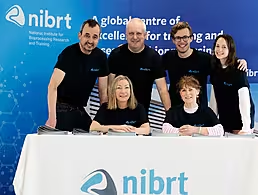Virti’s Alex Young shares some key questions to ask candidates when you’re looking to expand your learning and development team.
Successful businesses are built on successful teams. Successful teams are built with world-class learning and development (L&D) programmes. And world-class L&D needs a competent and passionate manager at the helm!
Sounds straightforward, right? Well, maybe not exactly.
In a recent Open University survey, eight out of 10 public sector staff said learning and development was central to job satisfaction and retention. But often, organisations struggle to hire the right person to raise the standard of their in-house L&D offering.
One secret to getting it right, in my experience, is asking tailored and targeted questions at the interview stage.
The ideal character will vary depending on your organisation’s culture and needs. However, as a framework, strong L&D managers must be able to mastermind the creation of a cohesive programme of resources, to apply best practices from their previous positions, and to select and deploy the right supporting technologies to maximise return on investment.
Most importantly, this person must be knowledgeable about the L&D space, with the drive and passion needed to make their ideas a reality.
To support you on your hiring journey, I’ve compiled this list of key questions that you can integrate into your L&D manager interview process. They’ve been designed to make sure that you find someone who’s the perfect fit for your company and who’ll help you to achieve your shared goals.
‘What does successful workplace L&D look like to you?’
Understanding what a person considers to be the ultimate goal of workplace L&D – and what their idea of ‘gold standard’ is – is a great way to identify how well they understand the mission and vision of your company. The ideal candidate might highlight some of the below indicators of excellence in any initiative:
- Tightly focused on the attainment of specified company goals
- One step ahead of key competitors
- Facilitating successful hybrid or remote working
- Improving employee engagement and performance
- Constantly evolving to improve outcomes and meet changing needs
But if your organisation thrives on a culture of innovation, for example, successful workplace L&D could look like a creative skill-building programme specifically to foster an innovation mindset in the workplace. Alternatively, it could involve rolling out data-backed wellbeing training to improve productivity and employee retention.
Most importantly, ask yourself if the candidate’s answer evidences vision and the enthusiasm to achieve their specified success metrics.
‘How will you measure and track progress towards key goals?’
So, you’ve established that the candidate is well aligned with your vision – great! But goals will never be reached without a robust mechanism for measuring your progress towards them.
The best L&D managers will be hyper-focused on measuring, collecting and tracking data, and will be able to produce reports to show progress and the impact of their projects. They should also be able to suggest the tools they will use for this purpose.
Successful measuring is likely to involve:
- Collecting consistent, tailored feedback from employees before, during and after participating in training
- Automation of the collection and analysis of data on employee performance and engagement with training
- Tracking engagement in L&D against other metrics of whole-company performance
‘Which L&D technologies will you use to help us stay ahead of the competition?’
L&D tech is booming, making it an incredibly fast-moving space. Keeping up with the latest innovative solutions – from XR training simulations to virtual soft skill coaches – requires a genuine interest and a real commitment.
An effective L&D manager will not be hung up on what worked in the past. Instead, they’ll be excited by new solutions and will be keen to embrace the latest cutting-edge technologies.
Asking this question will help you to find out whether the candidate has a readiness to evolve their practice in line with new technologies, so that your team can be properly supported to remain at the top of their game and ahead of the competition.
‘How can remote and hybrid staff be supported in L&D?’
There’s no ignoring the fact that our workplaces have changed irreversibly over the past two years. With the majority of employees preferring a remote or hybrid style, L&D programmes must be made accessible to all while remaining effective.
Your L&D manager should suggest well thought out strategies to engage staff working remotely. For example, a schedule of one-to-one video calls between mentors and mentees, or the development of immersive training simulations that can be accessed from home via mobile or desktop devices.
Alternatively, hybrid team training could be delivered in a virtual office and participants could interact via avatars.
‘How will you gather and utilise feedback from staff?’
Feedback is too often thought of as a nice-to-have, an afterthought. But in reality, it’s integral to any successful L&D programme. Understanding how your employees are engaging with training, what is and isn’t working, and how it’s impacting performance will enable you to make the right and necessary changes.
L&D managers should be confident in designing templates for real-time feedback forms and ideally will have some experience of more advanced feedback tracking tools such as sentiment analysis software that transforms verbal or written feedback into quantifiable data. They may have good ideas for online focus groups or incentive schemes to maximise participation.
Ideally the candidate should also be able to explain how they’d use feedback data to iterate and improve the next evolution of a training programme.
Hiring an L&D manager is sure to prove an important and a positive move for your organisation, leading to improved engagement, retention and performance among employees.
Get it right and it could be one of the best investments you make this year. But rest assured, with these questions in your interview arsenal, you’re already one step closer to finding a brilliant new team member.
By Alex Young
Alex Young is the founder of Virti, a digital training platform that aims to improve employee engagement.
10 things you need to know direct to your inbox every weekday. Sign up for the Daily Brief, Silicon Republic’s digest of essential sci-tech news.




